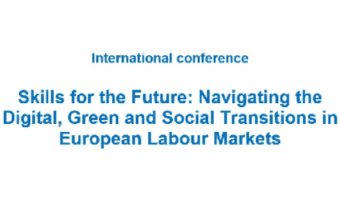Organised by the Luxembourg Institute of Socio-Economic Research (LISER) and co-funded by Luxembourg’s National Research Fund (FNR), the objective of the international scientific ELMI conference Skills for the Future: Navigating the Digital, Green and Social Transitions in European Labour Marketsis to bring together leading national and international scholars in the social sciences to address the challenges of the digital, green and social transitions for the labour market, society and education.
The conference marks the first international conference of the ELMI Network (Network of European Labour Market Research Institutes) initiated in October 2022 by the Luxembourg Institute of Socio-Economic Research (LISER) and the Institute for Employment Research (IAB). The ELMI network is currently composed of 11 research institutes from all over Europe, among wchich the IBS is one of the co-founder. It aims to facilitate the international exchange of best practices, ideas and people (for more information, see: www.elmi-network.eu). It promotes multi-disciplinary research collaborations, especially at the EU level, and the exchange of best practices in data management, data access and discussions with policy-makers and stakeholders.
We are particularly interested in papers that address the following issues:
- What are the current and projected skill gaps in Europe’s labour market, and how are they related to the digital, green and social transitions?
- How can we measure skill shortages? What data can be mobilised to measure skill gaps?
- What are the key drivers of skill gaps and how can they be addressed? How are skill demands changing in the digital, green and social transition? What is the role of labour supply?
- What are the consequences of changing skill needs and skill gaps for economic growth, inequality and social cohesion? How are labour markets, sectors, firms and individuals adopting?
- What role can employers play in upskilling their existing workforce and how can they be incentivised to invest in training and development?
- How can employers organise the division of work and the relationship between the workforce and robotisation processes?
- How can governments, policymakers and stakeholders (trade unions, employer organisations…) better anticipate and respond to changes in skill needs in Europe?
- Do existing initiatives and measures in Europe suffice, and are policy initiatives efficient and efficiently implemented in the EU members states?
- What role do immigration policies play?
Keynote speakers
M. Nicolas Schmit, European Commissioner for Jobs and Social Rights, European Commission.
Prof. David Hémous, UBS Center for Economics in Society, University of Zurich.
Third keynote to be announced soon.
ELMI Scientific Committee
- Prof. Christina Gathmann, Luxembourg Institute of Socio-Economic Research (LISER)
- Prof. Bernd Fitzenberger, Institute for Employment Research (IAB)
- Prof. Arne Uhlendorff, Centre de Recherche en Economie et Statistiques (CREST)
- Prof. Henning Hillmann, Center for European Social Research (MZES), University of Mannheim
- Dr. Maria Hemström Hemmingsson, Institute for Education of Labour Market and Education Policy (IFAU)
- Robert Joyce, Institute for Fiscal Studies (IFS)
- Dr. Hanna Pesola, Vatt Institute for Economic Research
- Piotr Lewandowski, Institute for Structural Research (IBS)
- Prof. Nikolas Mittag, Center for Economic Research and Graduate Education (CERGE-EI)
- Dr. Florian Lehmer, Institute for Employment Research (IAB)
- Dr. Terry Gregory, Luxembourg Institute of Socio-Economic Research (LISER)
- Patrick Thill, Luxembourg Institute of Socio-Economic Research (LISER)
Note for authors
We welcome excellent, critical and innovative contributions based on a sound methodology. We expect to receive papers from labour economics and social sciences (both qualitative and quantitative).
Authors are invited to submit their abstract in PDF format by using the LISER submission website. Abstracts should not exceed 300 words. Most sessions will have a duration of 1.5 hours. Therefore the sessions will include 3 to 4 papers with 15 minutes of presentation time per paper and discussion. We also organise a poster session and authors can submit posters via the LISER submission website. Abstracts will be peer-reviewed by the scientific committee and selected for presentation.
We also welcome excellent contributions from young researchers. So we offer a grant of 500 EUR to cover travel, registration and accommodation costs. Contributions will be selected by the scientific committee.
Key dates
26 June 2023 – Publication of Call for papers
15 August 2023 – Deadline for abstract submission
23 August 2023 – Notification of acceptance
30-31 October 2023 – International conference
Conference information
The conference takes place in the Halle des poches à fontes, Campus Esch/Belval, Esch-sur-Alzette, 6 avenue des Hauts Fournaux, L-4362 Esch-sur-Alzette, Luxembourg.
Registration fee: 150 EUR. The conference will be held in-person. A final conference programme will be published soon.
Local organisation: Patrick Thill (LISER), Carole Wiscour-Conter (LISER), Anna Dober (LISER).
Email for further information : Patrick.Thill@liser.lu or Anna.Dober@liser.lu


